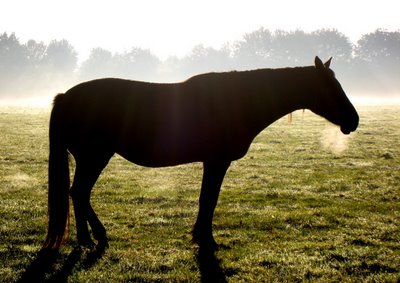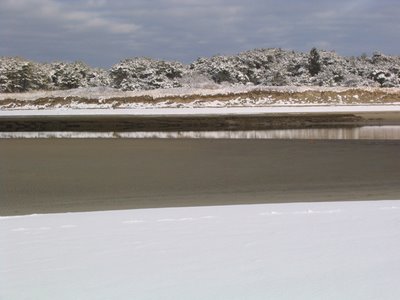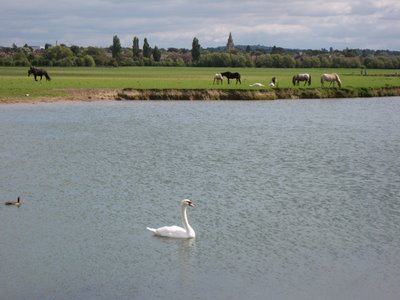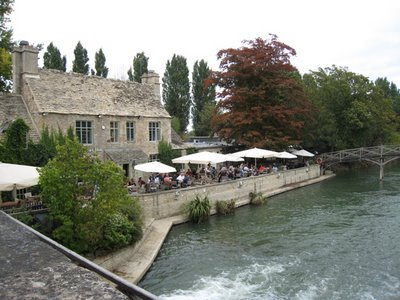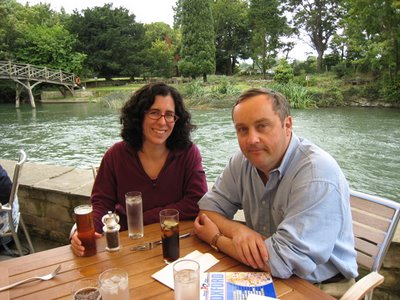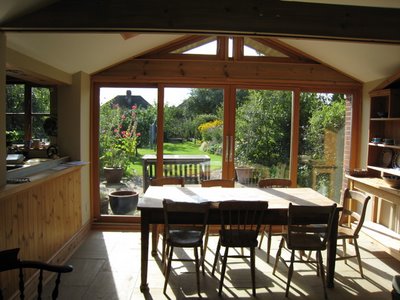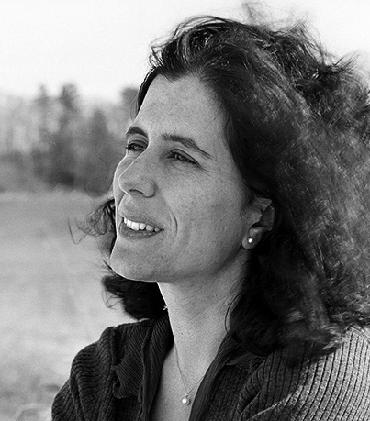Port Meadow Frost
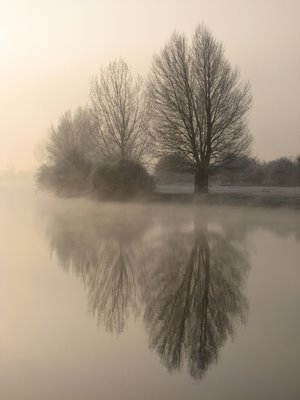
“What do you miss the most about home?” asked an American friend visiting Oxford. It was a rainy December day.
“Snow!” My children replied before I could answer.
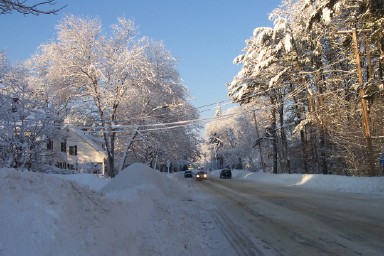 Brunswick, Maine on New Year’s Day 2008 (by Stephanie Foster)
Brunswick, Maine on New Year’s Day 2008 (by Stephanie Foster)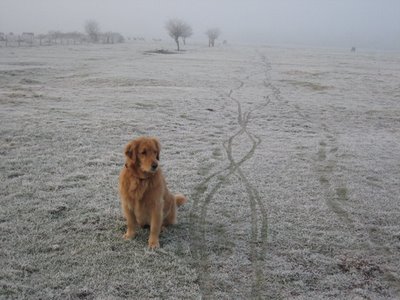 I had been missing snow until a deep frost settled over Port Meadow. My dog and I set off for our morning walk in mist so thick that it was hard to find the horizon. Bike ruts in the frozen grass looked like ski trails in snow. The meadow is a flood bank for the River Thames (called the Isis only in Oxford) and communal grazing grounds.
I had been missing snow until a deep frost settled over Port Meadow. My dog and I set off for our morning walk in mist so thick that it was hard to find the horizon. Bike ruts in the frozen grass looked like ski trails in snow. The meadow is a flood bank for the River Thames (called the Isis only in Oxford) and communal grazing grounds.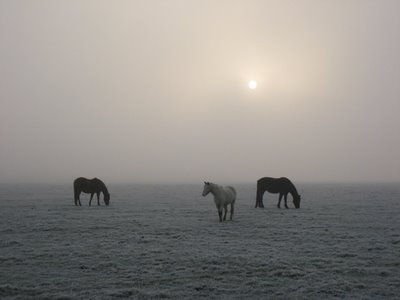 At this time of year, the cattle are gone and only a couple dozen horses are left to forage. Their warm breath melted the frost into green grass as the sun was struggling to burn through the clouds. Could this be England? I felt inside the pages of an Annie Proulx story, home on the western range. Or maybe a late Rothko painting?
At this time of year, the cattle are gone and only a couple dozen horses are left to forage. Their warm breath melted the frost into green grass as the sun was struggling to burn through the clouds. Could this be England? I felt inside the pages of an Annie Proulx story, home on the western range. Or maybe a late Rothko painting?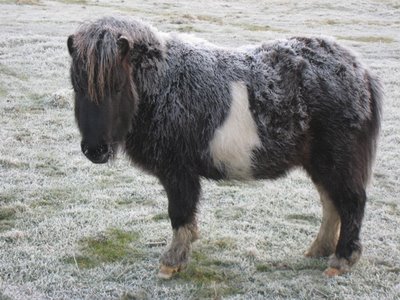 A Shetland pony, not much bigger than my dog, watched us with curiosity. She looked warm in her shaggy coat, even dripping frost. My dog wanted to play, but the pony lost interest once she realized that Stella’s tennis ball was not a green apple. Seeing us every day, the herd barely twitch an ear at my bouncing golden retriever.
A Shetland pony, not much bigger than my dog, watched us with curiosity. She looked warm in her shaggy coat, even dripping frost. My dog wanted to play, but the pony lost interest once she realized that Stella’s tennis ball was not a green apple. Seeing us every day, the herd barely twitch an ear at my bouncing golden retriever.Despite the chill, Stella was eager to get to the river. She swims in the ocean year round back in Maine. Seagulls, geese and swans eyed my swimming retriever nervously, but Stella kept her eye on the ball. The Greylag Geese were once domesticated but now have gone wild, interbreeding with Canada geese. The Queen owns the swans. No one can explain what seagulls are doing here this far inland.
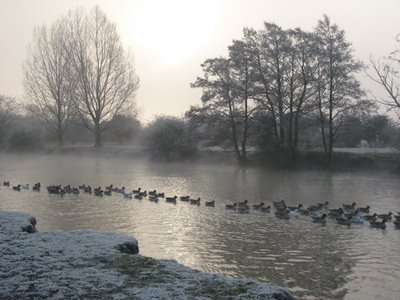 As we headed down the river past the lock, the water became a mirror. Another walker and his dogs were dots along the bank. Despite the beauty of dawn, we were otherwise alone. Even the wind had slept in.
As we headed down the river past the lock, the water became a mirror. Another walker and his dogs were dots along the bank. Despite the beauty of dawn, we were otherwise alone. Even the wind had slept in.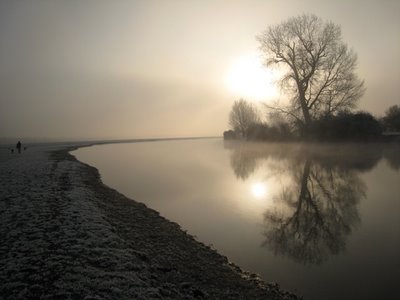 The only sound was the honking gaggle of geese. The meadow teams with myriads of migrating water fowl and attending bird watchers during the fall. My son and I once surprised some black and white birds that took off with a startled “Eeek!”
The only sound was the honking gaggle of geese. The meadow teams with myriads of migrating water fowl and attending bird watchers during the fall. My son and I once surprised some black and white birds that took off with a startled “Eeek!”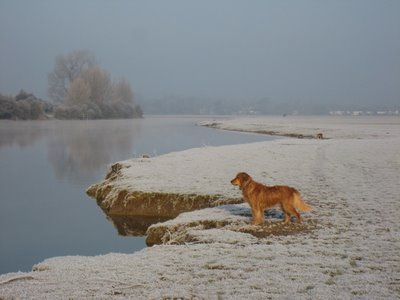 Port Meadow is dog heaven for a retriever. Every writer should have a dog. I do some of my best thinking for my novels on our walks. I’m sure Port Meadow will feature in NOT CRICKET. Not so sure about the wet dog . . . .
Port Meadow is dog heaven for a retriever. Every writer should have a dog. I do some of my best thinking for my novels on our walks. I’m sure Port Meadow will feature in NOT CRICKET. Not so sure about the wet dog . . . .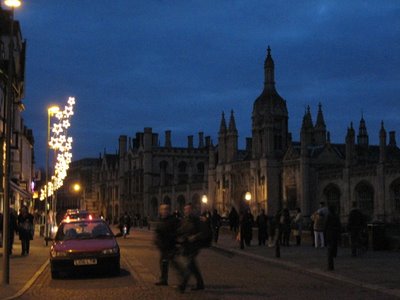 Happy New Year! We spent ours in Cambridge.
Happy New Year! We spent ours in Cambridge.Did other bloggers have trouble up-loading images or publishing? I fear everyone made a blog-more-often New Year's resolution.
Labels: Brunswick, Cambridge, country walks, dog, England, horses, Not Cricket, Oxford, Port Meadow, pubs, Wolvercote, writing
